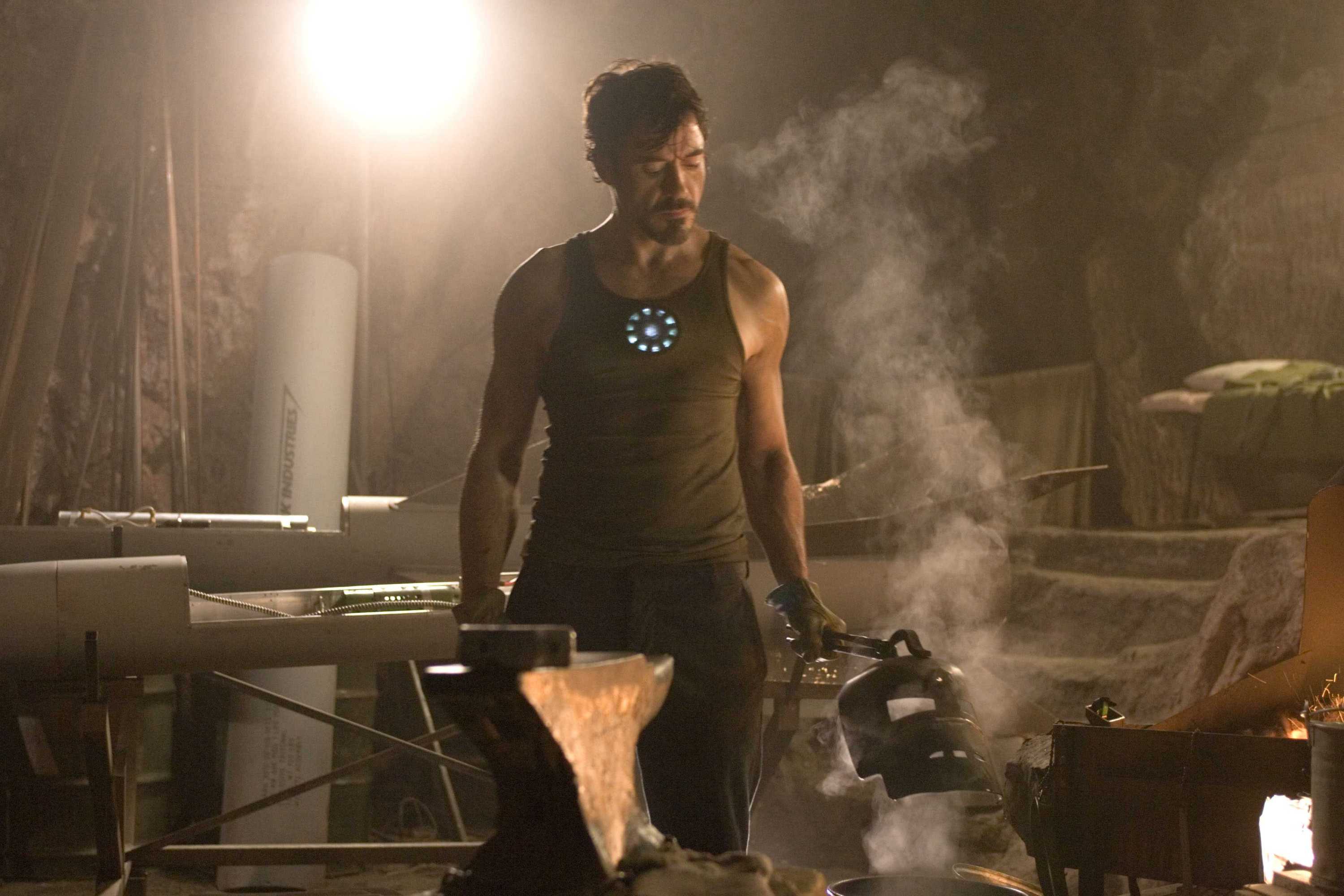
As a lead-up to Captain America: Civil War, the 13th film in the Marvel Cinematic Universe, hitting theatres this Friday, Matthew Bowers is taking a trip back through the MCU’s twelve previous films — seeing what holds up, what doesn’t, and what he might not have given a fair shake to the first time. Today is part one of that retrospective, covering 2008’s Iron Man through 2011’s Captain America: The First Avenger. Wednesday will cover 2012’s The Avengers through 2014’s The Winter Soldier, and the final installment on Friday will finish things off with Guardians of the Galaxy, Age of Ultron, and Ant-Man.
IRON MAN
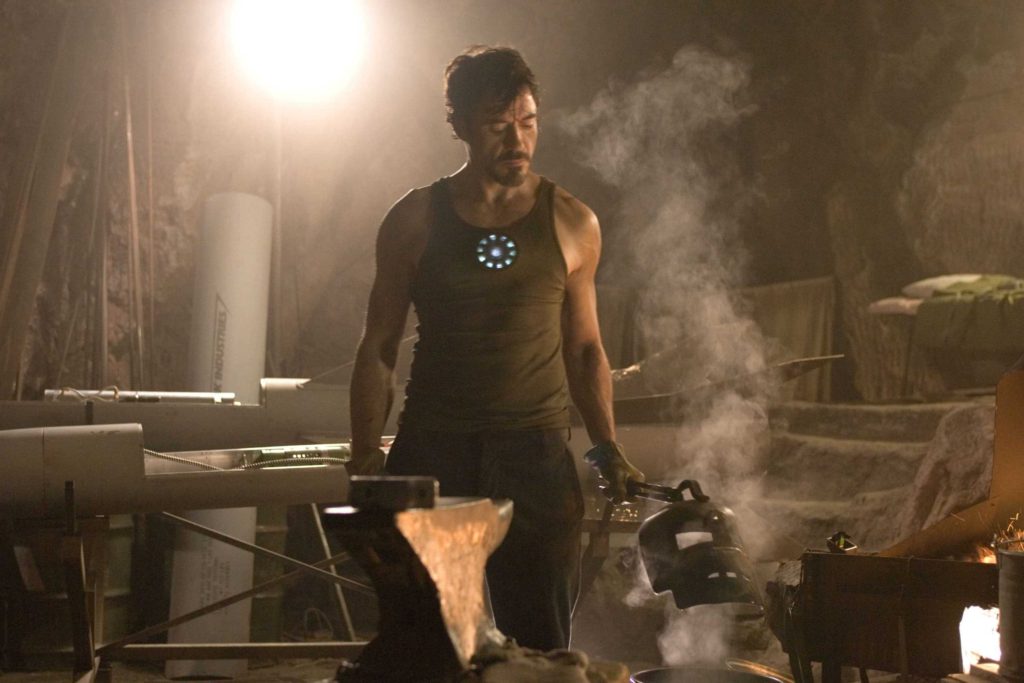
The very first film in the Marvel Cinematic Universe — a term that, in 2008, hadn’t yet been coined and didn’t really mean much of anything. Previous films based on Marvel properties had been something of a mixed bag — the first two X-Men and Spider-Man films, for instance, had been well-received, but reception for Hulk, Daredevil, a pair of Fantastic Four films, and the third entries in the X-Men and Spider-Man trilogies had been somewhat cooler — and the company decided that the right studio to make a Marvel film would be Marvel itself. Iron Man, chosen mainly because he was one of the last major heroes who hadn’t been seen on-screen yet (and because the film rights to the character had recently reverted back to Marvel from New Line), would be a relatively low-budget test balloon, a way to see if Marvel could succeed where other studios had failed. Given that we’re twelve films deep in this franchise, and Robert Downey Jr.’s Tony Stark has proven to be one of the most popular on-screen superheroes of the past decade, clearly Marvel did something right. But how does the film itself hold up today, in retrospect?
Pretty darn good, actually. There’s a reason Iron Man is included as an example in Film Crit Hulk’s book Screenwriting 101; this movie is tight as a drum. The efficiency with which the film establishes who Tony Stark is, strips him down to his bare essentials, and then builds him back up as Iron Man is truly breathtaking. Tony has a clear, well-defined arc here, something later Marvel films would struggle with, as we’ll see. This is of course not just the result of strong screenwriting, but of Downey Jr.’s fantastic performance — you love him, you hate him, you can see the great man buried underneath all the arrogance and bravado, and you want him to emerge. The action and special effects are deployed strategically — no doubt for budget concerns — but the pacing of the film is so strong, one doesn’t really notice that this is a superhero film that’s relatively light on action. Jeff Bridges makes for a fantastic and threatening villain, and Gwyneth Paltrow proves to be more than a match for Downey Jr.’s brilliant-but-immature Stark. The removal of the terrorist leader halfway through the film feels anti-climactic, Jon Favreau’s workmanship-like direction would unfortunately cement the visual style (or lack thereof) for the entire MCU, and I tend to prefer Don Cheadle’s Rhodey over Terrence Howard’s, but all in all, this is an incredibly fun and exciting film that holds up even today.
THE INCREDIBLE HULK
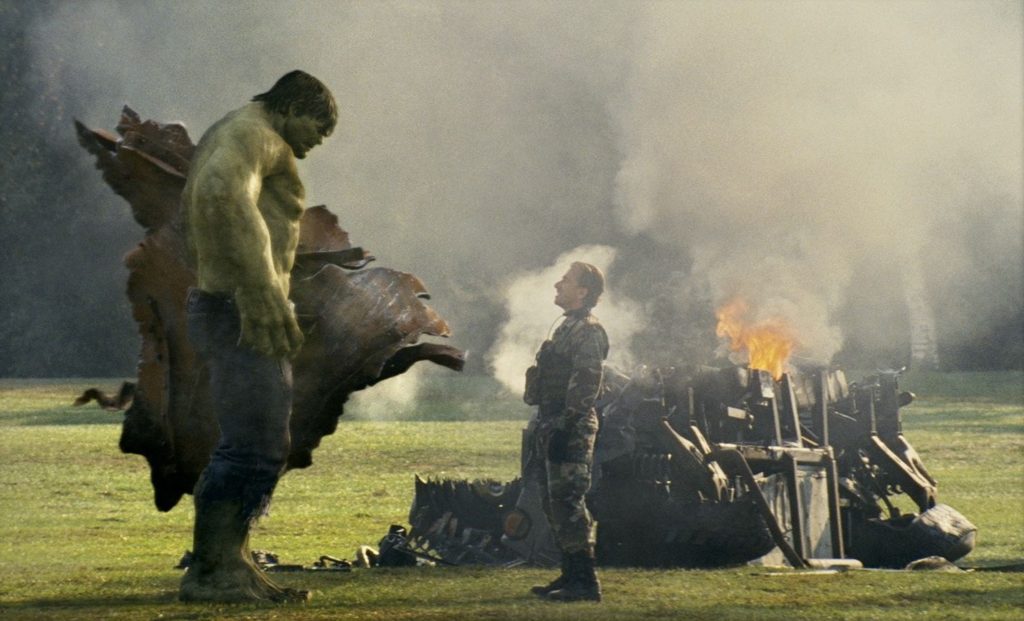
Going into production just two months after Iron Man had wrapped principal photography, this film was more a reaction to Ang Lee’s 2003 Hulk than it was to the (then-future) success of Iron Man. Essentially commissioned as a response to the fans who felt there wasn’t enough “Hulk smash!” in the first Hulk film, The Incredible Hulk has more of a man-on-the-run thriller feel to it, inspired mostly by the ‘70s TV show and the then-recent Bruce Jones/John Romita Jr. run on the comic. Unfortunately, the film trips over itself in trying to set itself apart from Ang Lee’s film while not quite dismissing it out of hand. The result is an awkwardly-structured mishmash that feels like it’s part-sequel, part-remake, which winds up being about two-thirds of a good film. Edward Norton and Liv Tyler, either through poor direction or not being engaged with the material, are complete non-presences here, while William Hurt just seems perpetually confused. The standout performance here is Tim Roth — partially because he really sinks his teeth into the role (and the scenery), and partially because he’s the one with a character arc, not Banner. The movie’s enjoyable enough to watch, due mostly to Roth and to Leterrier’s zippy direction, but the awkward structure keeps it from being much more than a curiosity. Especially given how little it connects to the MCU as a whole, and how the Hulk is the only featured MCU player to not get a follow-up solo film.
IRON MAN 2
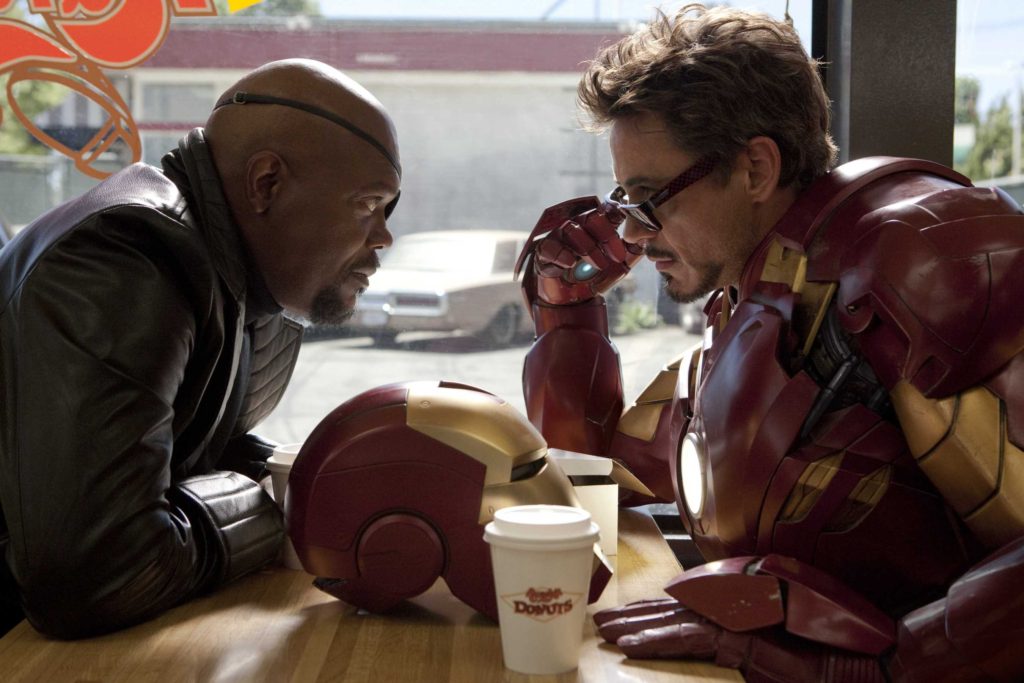
Ah. This movie. My memories of this film — as well as the general consensus — are of it being bloated, poorly paced and structured, filled with irrelevant table-setting exposition for the larger MCU, and basically unwatchable. Now, most of that is still true, technically. Tony completely lacks an arc, here; it’s more a binary state of asshole/not-asshole, based on his health at the moment. The Avengers table-setting business with Nick Fury and Black Widow does takes up a lot less screen than I remember. But the filmmakers’ reaction to complaints that the climax of the first film was just two CG robots pounding on each other was to construct a climax for this film that’s a lot of CG robots pounding on each other, which, to put it mildly, misses the point.
But. But. This movie is actually watchable. What’s more, this movie is actually entertaining. There are any number of great sequences and character moments; seeing Pepper truly come into her own here is great, Scarlett Johaanson’s Natasha Romanov kicks total ass, and seeing those two characters strike up an uneasy alliance and even friendship is something we don’t see enough of in these testosterone-driven action franchises. Sam Rockwell is hilarious as Justin Hammer, Don Cheadle is great as Rhodey 2.0, and even Mickey Rourke (remember how this was part of his big comeback? Yeah.) is interesting as Whiplash. The designs of War Machine and Whiplash are pretty great, also.
The structure is wonky. Tony does lack an arc. The ending is very anti-climactic. And there was a much more interesting movie to be made about legacy, and fathers, and letting go of the past. And it’s hard not to think that maybe this slot should have gone to a new protagonist, instead of revisiting Tony. Maybe even a lady protagonist (gasp)! But it’s not the train wreck I remember it being. If you go in with your expectations tempered, it might be worth revisiting.
THOR
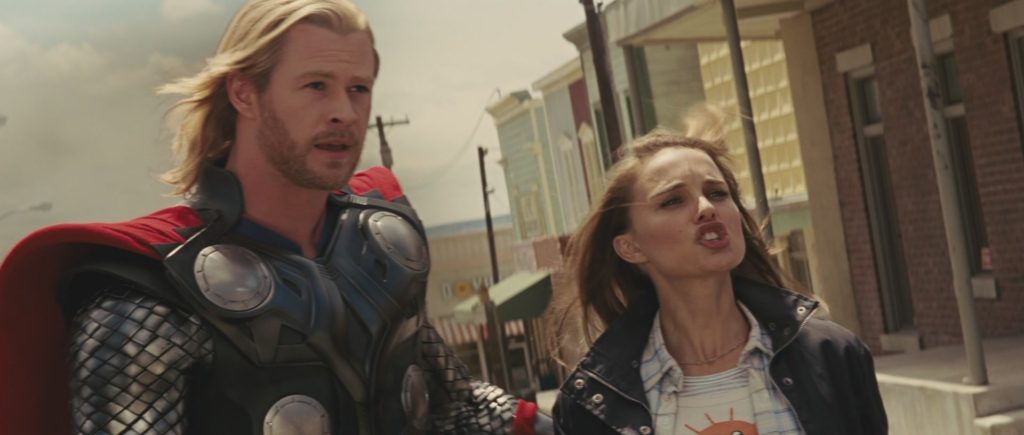
This movie, on the other hand, does not hold up at all. And how disappointing that is — I enjoy Chris Hemsworth, I enjoy Natalie Portman, and I enjoy (some of) Kenneth Branagh’s previous films. But, much like The Incredible Hulk, Thor tries to be two movies at once. And unlike The Incredible Hulk, Thor completely fails at both of them. A Thor film which barely featured Asgard and which focused almost exclusively on his time on Earth would have, I think, been much stronger. Then do Asgard in the sequel, once Thor has been established. We could have had an entire film of him doing his “fish out of water” thing, learning humility, and falling for Jane (and fending off attacks from a jealous Loki, if you still wanted to go that route). Instead we get all that, plus Frost Giants — possibly the most boring villains of the MCU, which is truly saying something — plus S.H.I.E.L.D. Honestly, Coulson and S.H.I.E.L.D. and Avengers table-setting felt like more of an intrusion on this film than they did on Iron Man 2.
Kat Dennings is still charming as hell, and Stellan Skarsgård is fun to watch as well. But the abbreviated nature of their courtship means Jane comes off as a giggling schoolgirl with regards to Thor, and not the badass well-rounded genius scientist she should be. All in all this, movie has bits and pieces that work, a scattered collection of fun and interesting moments, but altogether it’s a failure. Also, Branagh, my dude, what is with all the dutch angles?
CAPTAIN AMERICA: THE FIRST AVENGER
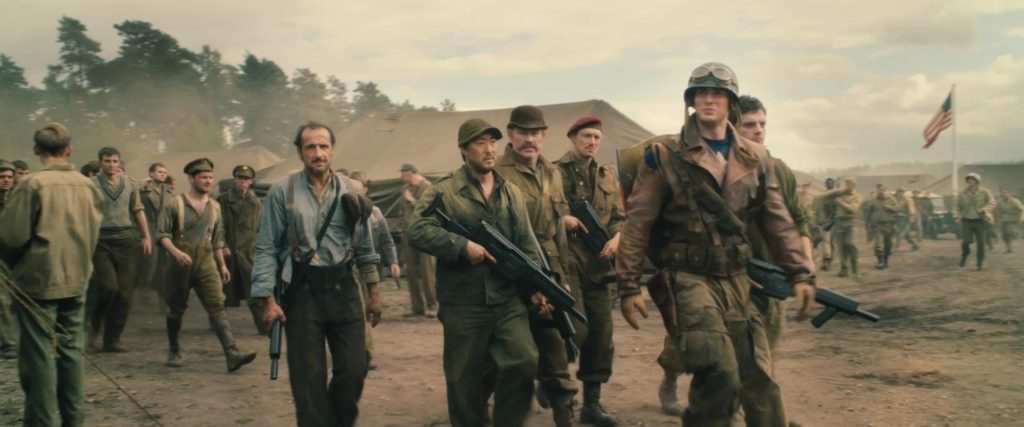
Now we’re talking. With the possible exception of The Avengers itself, this is easily the strongest film in “Phase One” of the MCU. Evans is perfect as Steve Rodgers, the kid from Brooklyn who wants to go to war — not for glory or excitement or to kill Nazis, but because he can’t stand by when other men are giving their lives for a righteous cause. We’re also introduced to Hayley Atwell’s Peggy Carter, and it’s easy to see how she managed to spawn a short film and a television series, even with the relatively small role she has here. Hugo Weaving is fantastic as Red Skull, and apart from Loki, is easily the MCU’s most charismatic and interesting villain. The entire cast is terrific, really.
The screenplay is tight and moves fast — maybe a little too fast in places, but the film is overall pretty well-paced. I would have liked a little more development of Sebastian Stan’s Bucky (particularly given the important role he plays in the subsequent Captain America films), and I’m disappointed the Howling Commando stuff is relegated almost exclusively to a montage. The action is all well-staged and executed, though; Joe Johnston was exactly the right choice for this movie, which feels more like an Indiana Jones film (or like Johnston’s own criminally-underrated The Rocketeer) than a superhero flick. There’s some unconvincing greenscreen here and there (which I guess only adds to that Indiana Jones feel), and the digital effects used to drop beefy Chris Evans’ head onto a scrawny body still doesn’t look quite right, but overall the effects are just as well-executed as the action and the acting.
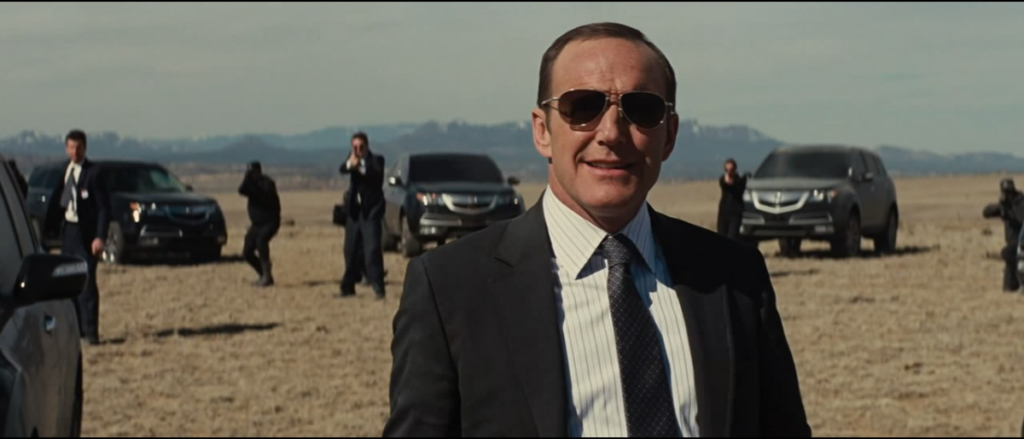
All in all, this first batch of Marvel films is something of a mixed bag. We’ve essentially got a collection of flawed-but-watchable movies (some tilting more one way than the other) bookended by two very strong films. Looking back now, some of the more egregious flaws seem more forgivable, while some of the wonder and excitement at simply seeing these characters on the big screen for the first time has worn off, revealing even more egregious flaws beneath. None of them are painful to watch, mind, but most of them do suffer from some pretty basic structural issues that should have been ironed out well before production began. The performances are all generally strong, however, and the visuals — while mostly straightforward and uninventive — bring these larger-than-life characters to, well, life, in convincing and often breathtaking fashion.
Wednesday, we’ll have a look at the culmination of an unprecedented cinematic experiment — The Avengers — as well as dip our toe into the murky and uncertain waters of Marvel’s “Phase Two.” Will Marvel raise the bar with its second batch of films? Keep what works, fix what doesn’t, and barrel onwards stronger and better than ever before? Or will it flounder and indulge in the rushed, half-assed storytelling which plagues so many sequels which are announced even before their predecessors hit screens? Come back Wednesday for part two of our MCU retrospective and find out!


![[REVIEW] CLUE: CANDLESTICK #1](https://geekd-out.com/wp-content/uploads/2019/05/clue-candlestick-150x150.png)
![[PODCAST] THE COMICS AGENDA: SUPERHEROES? MORE LIKE SUPER BORING!](https://geekd-out.com/wp-content/uploads/2017/11/comics-agenda-2-150x150.jpg)
One thought on “The Marvel Cinematic Universe Rewatch project: Part One”